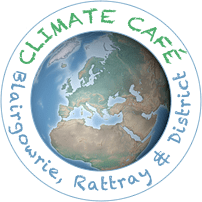A-Z of Climate Change
Date: Thursday 3 September

This is the first part of an article that appeared in the Blairgowrie Advertiser. The second part (N-Z) will appear here soon.
Coronavirus and the Climate Crisis
Life has changed with Covid, but the climate crisis has not gone away.
Science makes clear the links between this virus and our damaged planet.
The pandemic is a wakeup call to put the environment at the heart of our "New Normal"
What changes should we hold on to? What not go back to?
The Climate Cafe is highlighting our concerns with a little
A - Z of climate info.
A. air quality improved amazingly during lockdown, due to dramatic reduction in emissions from travel and dirty industry. People in cities noticed how much cleaner the air was; good news for anyone with heart and respiratory conditions.
This improvement can continue, but depends on our willingness to move away from petrol and diesel.
B. beaches covered in waste, especially plastic, shows just how much of what we throw away ends up in the oceans. Unfortunately, this now includes face masks and plastic gloves. The Marine Conservation Society has organised beach cleans in UK and has recorded and analysed the amounts and types of marine litter. Even cigarette tips dropped on pavements can end up as microplastics in rivers, oceans and in our food.
www.mcsuk.org
www.4ocean.com
biodiversity: the enormous variety of all forms of plant and animal life, both on land and in the oceans. We take for granted the many important species (such as bees) on which we depend but they are under threat because of habitat destruction and rapid changes in their environment.
C. carbon footprint: your total amount of greenhouse gases generated. What you eat, what you buy, how you heat your home and how you travel all contribute to this. Measure your own before lockdown, then during lockdown - see what difference there is and what made that difference.
Www.footprint.wwf.org.uk
carbon emissions: release of carbon dioxide into the atmosphere. This is only one of the greenhouse gases (see below) contributing to global heating.
D. 1.5 Degrees: The IPCC (see below) needs us to limit global heating to 1.5 degrees’ rise compared to pre-industrial levels. This requires dramatic reduction of greenhouse gas emissions. Exceeding this means severe consequences for all life forms including humans.
Www.sciencebasedtargets.org
Www.wemeanbusinesscoalition.org. ....
Www.channel4.com. Climate change in ten graphs.
E. Ecology: From Greek oikos - home.
The relationships between the air, land, water, animals (including humans), plants and the scientific study of this.
F. Fracking: Hydraulic fracturing - how gas (and petroleum) is extracted from bedrock, usually sandstone, by high pressure injection of water, other fluids and additives, then sand to keep the fracture open.
Leakage of methane and extensive use of water are issues of concern as well as local water contamination, earth tremors and health problems.
Flooding: set to increase globally. Is also predicted to affect this area.
Fast fashion: is no friend to the environment. Exemplifies throwaway consumerism.
G. Green recovery: the opportunity we all have to change the way we live after Covid.
Greenhouse gases: Water vapour (H2O), carbon dioxide (CO2), methane (CH4), nitrous oxide (N2O), ozone (O3).
Www.britannica.com greenhouse effect
Www.climatekids.nasa.gov - meet the greenhouse gases
H. Heating: poorly insulated homes and businesses waste energy.
Www.theheatproject.scot
I. IPCC: Intergovernmental Panel on Climate Change - part of United Nations - provides objective, scientific information on human-induced climate change. archive.ipcc.ch
J. Just transition: Implementing a move to environmentally and socially sustainable jobs. As well as reducing carbon footprint, helping address inequality and poverty.
Www.gov.scot/groups/justtransition
K. Knowledge: Thanks to thousands of scientists worldwide, we know the climate is destabilising - humanity needs to act. This is not opinion!
L. Linear economy: Source raw materials - make products - use them - throw away.
Must become a circular economy - fewer raw materials - make products designed to last, easy to repair, can be recycled many times - less waste.
M. Methane: Greenhouse gas - almost 30 times more potent than carbon dioxide. Half now comes from human activity - oil and gas production, coal mining, cattle and sheep farming and from landfill sites. Now seeping from the Antarctic seabed and from previously frozen areas of land.
Previous Posts

PKC Climate Commission
What should PKC's priorities be on climate a... Read More >
Taybank growers' Open Day 9th July
Taybank Growers are holding an open day on J... Read More >